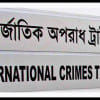Refer Myanmar to ICC now
Four global human rights bodies have demanded that the UN Security Council immediately refer the situation in Myanmar to the International Criminal Court (ICC) for holding accountable the perpetrators of widespread and systematic abuses against the Rohingya in Rakhine.
The call came a week after a 15-member UNSC delegation visited Bangladesh and Myanmar. Diplomats pledged actions on their return to New York.
After the visit, UK Ambassador Karen Pierce, who was a delegation member, said all council members considered the Rohingya issue to be “one of the most significant human rights cases that we have ever faced in the last decade and that something needs to be done.”
More than 700,000 Rohingya refugees have fled Myanmar military abuses, including killing, rape, torture, burning and looting of houses, since August 2017 and have taken shelter in Bangladesh. They joined some 300,000 more Rohingyas who fled previous waves of violence in Myanmar where they had been discriminated since 1982.
“Now that the Security Council has heard directly from Rohingya refugees about the horrors inflicted by Myanmar's army, the need to hold those responsible to account should be clear,” said Param-Preet Singh, associate international justice director of Human Rights Watch (HRW), in a statement.
HRW, Fortify Rights, Amnesty International and the Global Centre for the Responsibility to Protect also made similar demands at a press conference organised by the UN Correspondents Association in New York on Tuesday.
While acknowledging a possible ICC referral, UK Ambassador Pierce told reporters that Aung San Suu Kyi assured council members that if she was provided evidence of violations, the Myanmar authorities would undertake a “proper investigation”.
HRW says Myanmar government has long been provided with evidence by the rights body and other international monitors and has taken no genuine action to impartially investigate the full range of abuses committed against the Rohingya.
Also, for more than a year the government refused to allow access to the UN Fact-Finding Mission to “establish the facts and circumstances” of alleged security force violations. It also barred Yanghee Lee, the UN-appointed human rights expert on Myanmar, from entering the country after she publicly reported on military abuses.
The Myanmar government and military have dismissed voluminous reports from the UN, human rights groups, and the media on killings, rapes, and burnings of Rohingya villages in northern Rakhine State.
“By rejecting out of hand detailed accounts of atrocities, Myanmar's government has shown it has zero intention of addressing the terrible crimes against the Rohingya,” Param-Preet said.
She said Myanmar's repeated and implausible denials of responsibility for atrocities and its longstanding culture of impunity mean that the ICC is the only real hope for victims to see justice.
“Security Council members should not repeat empty promises by government officials that they will investigate abuses. This is a textbook case for referral to the ICC, which was created to act when governments refuse to do so.”
Under the Rome Statute of the ICC, the court can only act when a state is “unwilling or unable” to investigate or prosecute grave crimes in violation of international law. Because Myanmar is neither a party to the ICC nor has accepted the court's jurisdiction, the Security Council needs to refer the situation to the court.
In April, ICC Prosecutor Fatou Bensouda asked the court to rule on whether the ICC “can exercise jurisdiction over the alleged deportation of the Rohingya people from Myanmar to Bangladesh,” which is a party to the ICC.
On May 7, ICC has invited Bangladesh to submit written observations on whether the Hague-based court can exercise jurisdiction over the deportation of Rohingyas from Myanmar to Bangladesh.
Southeast Asia-based Fortify Rights said the Bangladesh government should encourage the ICC to exercise jurisdiction to investigate and prosecute the international crime of deportation of Rohingya Muslims.
“We strongly support this and other proactive steps to hold the Myanmar military accountable for international crimes against the Rohingya,” said Matthew Smith, chief executive officer of Fortify Rights, in a statement on Tuesday.
“The Bangladesh government should do everything in its power to cooperate and seek justice for the human rights violations against the Rohingya.”
He said domestic remedies have been exhausted in Myanmar, and that's precisely why a referral is warranted.
Savita Pawnday, deputy executive director at the Global Centre for the Responsibility to Protect, said they believed crimes against humanity and possible acts of genocide were committed against the Rohingya.
“We would like to urge the Security Council to adopt a resolution referring the situation in Myanmar to the ICC,” she said at the press conference in New York.
Despite early warning, the Council has failed to prevent systematic attacks against the Rohingya. By referring the situation in Myanmar to the ICC, they can at least begin the process of countering the narrative of denial perpetuated by Myanmar and ensure justice for the Rohingya.
Tawanda Mutasah, senior director at Amnesty International, urged the UNSC to refer Myanmar's atrocities to the ICC, and said: “This is important because in the context of Myanmar there is no national credible mechanism for accountability at the moment.”
REPATRIATION
Myanmar will take back more than 1,000 Rohingyas who have fled to Bangladesh from northern Rakhine State, reported Myanmarese newspaper Irrawaddy yesterday, quoting Union Immigration and Population Minister U Thein Swe.
Bangladesh gave Myanmar a list of just over 8,000 refugees willing to return to Rakhine in February. Myanmar has since verified more than 1,000 of them as former residents and provided their names to Bangladesh; it is still reviewing the rest of the list.
“We have so far verified about 1,100 refugees on the list,” Swe said at a programme in Naypyitaw on Monday.
Bangladesh and Myanmar signed a repatriation agreement in January, but none of the refugees has returned to Myanmar to date, Swe added.

 For all latest news, follow The Daily Star's Google News channel.
For all latest news, follow The Daily Star's Google News channel. 








Comments